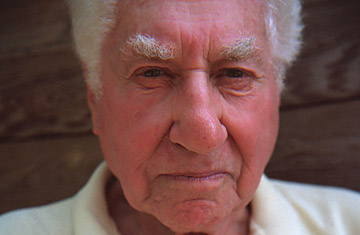
Author and Screenwriter Budd Schulberg, 88, at his home in Long Island.
(2 of 2)
In Moving Pictures, Schulberg slammed Fitzgerald's early novels and B.P.'s movies, charging that both were "stricken with a double vision and a double morality, glorifying the society they were so heatedly exposing, exposing the society they could not resist glorifying." He wrote the character of Sammy Glick, his novel's screenwriter antihero, as such a crass schemer, appropriator of other men's work and trampler of decency that no one could possibly mistake him for a role model. Yet Sammy became just that for many a brash entrepreneur in Hollywood and on Wall Street. Schulberg later said he was pained that Glick, reputedly based on writer-producer Jerry Wald, had become a template for go-getter corporate America. The novel did not endear Schulberg to Mayer, who told B.P. that Budd should be deported. "He's a U.S. citizen," B.P. supposedly answered. "Where the hell are you gonna deport him? Catalina Island?" Sammy remains one of the few popular Hollywood novels never to have been turned into a Hollywood movie.
While serving in the Navy during World War II, Schulberg was assigned to the Office of Strategic Services (OSS), where he worked with director John Ford's documentary unit. Schulberg created photo documentation for the Nuremburg trials and personally arrested German filmmaker Leni Riefenstahl at her chalet in Kitzbühel, Austria. Following his military service, Schulberg wrote the fight-racket novel The Harder They Fall and had no more movie credits until he and Kazan teamed up for On the Waterfront, for which John Garfield, Frank Sinatra and the young Paul Newman were touted for the Terry Malloy role that Brando made his own. The project brought out the best in Schulberg's muckraking temperament, and served as an apologia for informing on fellow (Daily) workers. On naming names, Schulberg later said: "I felt that what the Party was doing secretively was very wrong; it could have been the Ku Klux Klan or the American Nazis. And nobody came out and said that Stalin was killing more people than Hitler."
The Oscar platform Schulberg had mounted for Waterfront proved a soapbox in A Face in the Crowd (1957), another Kazan film with Andy Griffith as Lonesome Rhodes, a singing hobo who becomes a multimedia demagogue. (The character was said to be fashioned on folksy radio and TV host Arthur Godfrey.) Lonesome's derisive description of his audience is pure Schulberg: "Rednecks, crackers, hillbillies, hausfraus, shut-ins, pea-pickers — everybody that's got to jump when somebody else blows the whistle. ... They're mine! I own 'em! They think like I do. Only they're even more stupid than I am, so I gotta think for 'em." Of course it was Schulberg who was doing the thinking for moviegoers.
After 1958's Wind Across the Everglades, which dramatized the mission of the Audubon Society to protect Florida's plume birds, Schulberg decided he was done with Hollywood. He wrote several volumes of memoirs and adapted Sammy, Waterfront and his Fitzgerald novel, The Disenchanted, into Broadway shows. By the 1970s he had retired to Westhampton, L.I., as the grizzled grandee of American fiction, page and screen.
Yet his old, immortal works kept pursuing Schulberg. Just a week ago before his death, he attended a staged reading of On the Waterfront in Hoboken, N.J., where it was set and filmed. Among the players were Vincent Pastore (Big Pussy on The Sopranos) as the mob boss Johnny Friendly and Jason Cerbone (Jackie Aprile, Jr., also a Sopranos alumni) in the Brando role. The 55-year-old script still had the fresh stench of local corruption. Hoboken's new mayor, Peter Cammarano, had recently been arrested in the sweeping federal indictment of Jersey politicians; he would resign two days after the reading. A part of Schulberg must have been pleased at this latest criminal evidence of the society he kept exposing but never glorified.
